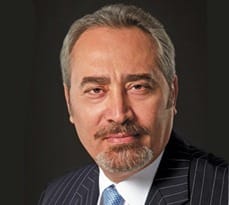Tirad Mahmoud is leading a mission to redefine the Islamic banking business model, so what are his own leadership values and who are the people he admires?

I believe leaders are defined by their followers. The essence of leadership is not something I’ve ever read a book about – real leaders have a clear vision, and the passion and hope to achieve it. The world out there is looking for someone who offers hope for better things to come, in business and in life.
As a child, vacations were spent hunting. I was in a government school in Qatar, and there was no air conditioning, so we would have a very long break during the hot season. We spent it in the Levant, in the wild of the mountains. There, I would go out with boys my own age setting up traps for birds using grain that we boiled with a tranquilising drug – we were too young for guns. It was very peaceful, no shooting – the best way to catch pheasants! My childhood was not spent watching TV. I was very active – I was never a quiet child sitting in my corner. I was always on the run. I was the eldest, so I took on some of the responsibilities of looking after my younger siblings, but nothing out of the ordinary.
My greatest influence was my father, Marouf Rafiq Mahmoud. He believed very strongly in public service. He was a poet, a teacher of poetry and Arabic literature, a columnist for a newspaper, and had a talk show on the radio on which he would host celebrities. All he did was powered towards the betterment of life for the people. He was a moderate person – he always looked for opportunities to speak about peace and progress in society. He took me with him to his events, where I’d sit in the audience and watch him perform at his best. He never pursued money or wealth, though he could have – he had the talent, and was a lawyer by education. The kind of wealth he created was not financial. The dividends he reaped were from service in the public good.
The leaders I admire the most are the game-changers. I learnt a lot about leadership from the founder of Apple, Steve Jobs. He was obsessed by a vision of what he wanted to do in life. He was a passionate leader who drove an organisation and a generation of people to create a new paradigm. Another person who impresses me is Bill Gates, for his philanthropy. Microsoft has been a huge game-changer, but it’s what he and his wife do to change the lives of others that I truly admire. He has given away nearly all his wealth, and started a movement among the super-rich of giving their money back to society. And there is Mohammed bin Rashid Al Maktoum, UAE Prime Minister and ruler of Dubai. He built Dubai with a very clear vision. It’s a role model for the Middle East and Africa, giving hope to the region that we significantly improve our lives. Dubai is not relying on its oil and natural gas resources. Al Maktoum has managed to attract capital and talented people and has rewarded them for their investment by creating a successful, international city.
I believe Islamic banking has so much potential. The challenge I have is to redefine the business model and make sure the main stakeholders for that model – the sharia scholars – subscribe to the ideas I have. We have begun to get the scholars to work on the platform of the universal, ethical business. Abu Dhabi Islamic Bank was created as a community bank for Muslims, but I think it is good for everybody, and we need to develop its universal appeal. The scholars have been very excited about it, but that is not enough. I need to build sustainable momentum to create the evolution of the universal model. I wish I could live for 1,000 years to achieve all the things I want to achieve.
At our bank, profit is just an outcome. Some people try to use money to motivate people, but they need something else. What my people work for is the ideal of a business with universal values. Coming out of the financial crisis, we are trying to create banking as it should be – contributing to a better life for all. My staff believe in that, but I had to define it for them. So my advice to a young leader is that you have to understand why you are there and what you are trying to do. What are you trying to achieve? With that in mind, you have to be committed to it, and go about it.
This morning, 14 May 2014, Tirad Mahmoud delivered the keynote address at the launch of Cambridge Judge Business School’s new Middle East Leadership Research Centre, which took place at the American University of Sharjah in the UAE. Find out more

